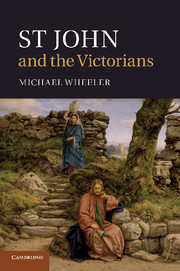Chapter 2 - ‘The most marvellous enigma’
The fourth gospel
Published online by Cambridge University Press: 05 December 2011
Summary
And there are also many other things which Jesus did, the which, if they should be written every one, I suppose that even the world itself could not contain the books that should be written. Amen.
(John 21.25)Traditional and critical orthodoxies
The eponymous hero of Mary Ward's Robert Elsmere (1888) is fascinated by accounts of the Higher Criticism that he hears from his learned neighbour, the anti-Christian squire Wendover, who knows Renan personally, and whose wonderful library contains ‘early editions of the Leben Jesu, with some corrections from Strauss's hand’ (ch. 14). In order to protect his faith, however, the rector draws the line at a discussion on St John:
One morning the squire unexpectedly plunged into an account of a German monograph he had just received on the subject of the Johannine authorship of the Fourth Gospel. It was almost the first occasion on which he had touched what may strictly be called the matériel of orthodoxy in their discussions – at any rate directly…
‘I think we ought to understand one another perhaps, Mr. Wendover,’ Robert said, speaking under a quick sense of oppression, but with his usual dignity and bright courtesy…‘If there are literary difficulties, I must want to smooth them away – you may want to make much of them.’ (ch. 22)
Subsequently, as Elsmere agonizes over the prospect of ‘a purely human Christ’ and his faith crumbles (ch. 24), one of the ‘test points’ on which he pounces feverishly is ‘the Gospel of St. John’ (ch. 25).
Matthew Arnold – Mary Ward's ‘Uncle Matt’ – had written extensively on the ‘literary difficulties’ raised by the Higher Criticism in the previous decade, in works such as Literature and Dogma (1873), which provided the intellectual matrix for Robert Elsmere. In God and the Bible (1875), Arnold responded to objections to Literature and Dogma and replied to Walter Richard Cassels's best-selling Supernatural religion (1874). Arnold argued in God and the Bible that some of the statements (logia) of Jesus recorded in the fourth gospel were probably based on fact, and that some of the stories that are unique to John, such as the raising of Lazarus, probably grew up around those statements for illustrative purposes. The writer, he suggests, ‘is not so much at home among the incidents of his story; but then they lend themselves all the better on that account to his main purpose, which is to plant his logia.’
- Type
- Chapter
- Information
- St John and the Victorians , pp. 29 - 51Publisher: Cambridge University PressPrint publication year: 2011



